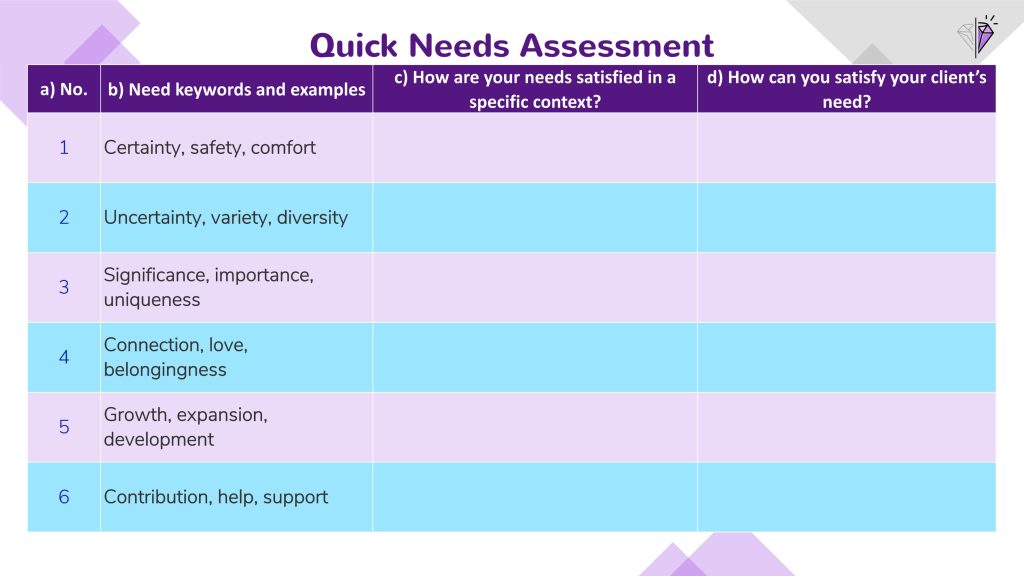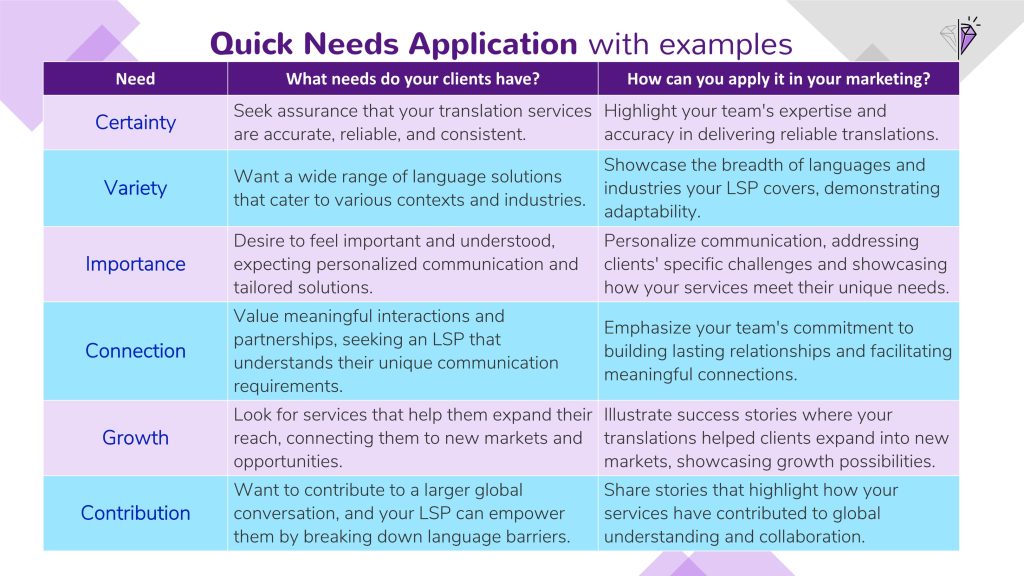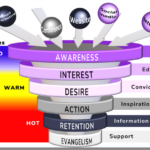
Address your clients’ needs properly to sell effectively
General
Have you ever wondered what really drives your clients’ actions and decisions? Why do some strive for constant growth while others yearn for stability? The answer lies in a fundamental understanding of human needs. We’ll show you how to use this knowledge step-by-step to develop a successful marketing strategy for LSPs.
This blog is about the 6 basic human needs that drive everything from our emotions to our career choices. When you recognize these needs, you have the key to your clients’ hearts and minds.
To understand basic human needs, you may use the traditional Maslow’s hierarchy of needs as a starting point.
However, for the purpose of B2B marketing, we’ll focus on Tony Robbins’ framework of the six basic human needs: CERTAINTY, VARIETY, IMPORTANCE, CONNECTION, GROWTH and CONTRIBUTION. We’ll show you how to recognize the need and how to address it in practice to sell your translation services more effectively. And you won’t have to worry if you are shooting in the dark.
Quick Needs Assessment
To simplify the process, you can use the Quick Needs Assessment and Quick Needs Application frameworks described below. This way, you can find out what your company and current and/or future clients’ needs are and how you can put them into practice.
Why yours, too? Knowing exactly how your company’s needs are being met will also help you better assess what your client really needs. And when you know how to satisfy the needs, you can present them to your existing and potential clients.
The initial analysis
For the initial analysis, you can use your current client in the Quick Needs Assessment (Table 1) because it’s easier. For future clients, you can create your own buyer personas, which are semi-fictional representations of your ideal clients based on market research and real data about people, organizations or companies. Just a quick tip on this: If you have a drawing or a puppet in front of you that represents your buyer persona, it can help you focus on the right words instead of just writing without help.
So, the steps are as follows:
1. Brainstorm each need and be clear about how exactly you meet the need in your business context, for example, in your relationship with freelancers. Write down your findings in column c to get a sense of how it works.
2. In terms of your client’s six needs, ask yourself what actions you are or are not taking, how you can make progress in meeting a need, and which needs have higher priority. Record your findings in column d.
3. Analyze your findings in the context of your marketing.
Quick Needs Application
Then you can apply the findings in the Quick Needs Application framework as exemplified in Table 2.
Needs vs. values vs. principles
Needs often take precedence over values and principles. For example, imagine a situation where someone places great value on honesty but desperately needs a job to survive. They might face a moral dilemma – be honest in the interview and risk not being hired or bend the truth to secure the job. This illustrates the tension that can arise between immediate needs and long-term values.
Deeper understanding of the needs for your success
To deepen your understanding of basic six needs and their application in practice, read the following descriptions of each need:
1. Certainty
Feeling safe and secure is a basic human need, and for some it’s a constant drive. Perhaps you long for positive recognition but are also afraid that it won’t last.
And the truth? Life rarely stays the same. While you can’t control everything, you can find comfort in routines, such as planning or organization. But don’t be afraid to think outside the box a little. It can be scary, but it can also be rewarding.
Signs that you crave certainty:
● You’re reliable and keep your promises.
● You love schedules and organization.
● New experiences make you nervous.
How to find a balance:
● Do things you enjoy, even if they’re a little scary.
● Create healthy routines that give you strength.
● Help others – this promotes growth and purpose.
Everyone needs certainty, but too much of it can lead to boredom, while a little uncertainty can be a pretty good thing! It makes life interesting and drives us to discover new things. Let yourself be surprised, and you’ll surprise yourself!
2. Variety
The longing for variety and new experiences is one of our basic human needs. It’s this feeling that drives us to explore new places, learn new skills and meet new people.
Just as a delicious meal needs a variety of flavors, a fulfilling life needs a variety of flavors. Embracing new experiences keeps things fresh and exciting.
Signs that you long for variety:
● You’re the life of the party and always ready to meet new people.
● Trying new things is your thing, from restaurants to hobbies.
● You juggle several interests and can’t settle for just one.
How to find a balance:
● Challenge your mind: read a lot, learn new skills, take online courses.
● Bring momentum into your everyday life: try a different workout, explore a new area, cook exotic recipes.
● Get together with other people: Join a club, volunteer, travel to new places.
By incorporating small changes and new experiences, you can keep your life exciting and fulfilling without overdoing it.
Remember that variety is only part of the equation. We all crave some stability and predictability too. So if you find yourself bouncing from one thing to the next without ever being truly satisfied, it could be a sign that you need to find a healthy balance.
3. Importance
Deep down, we all have the need to feel important and unique and the feeling of making a difference. That’s your need for importance shining through!
The thing is: Everyone wants to feel important. We all have these unique talents and passions that set us apart. But how we fulfill that need can make all the difference.
Signs that you long for importance:
● The need for recognition: We all feel good when we’re seen, heard and appreciated. Recognition confirms our efforts and reminds us that we’re important. It’s like a virtual pat on the back that boosts our motivation and drives us forward.
● The two sides of the coin: The desire for importance can be a powerful motivator. It can drive you to achieve great things, set ambitious goals and commit to things that are important to you. However, the pursuit of importance can also lead you down unhealthy paths.
If you’re constantly craving validation or resorting to negativity to feel special, it could be a sign that your need for importance is out of balance. Here are some signs of this:
● Constant competition: do you recognize that you must win at everything, even at the expense of others?
● Drama llama: Do you crave attention, even if it means causing unnecessary drama?
● Perfection paralysis: Does your fear of failure stop you from trying new things?
Fortunately, there are many positive ways to satisfy your need for importance in a healthy way.
How to find a balance:
● Channel your competitive spirit: Challenge yourself with a new skill, learn a new sport or put your knowledge to work.
● Become a master: Commit to excellence in your chosen field. This journey will push you to grow and make an impact.
● Develop your leadership skills: Effective communication and collaboration skills will make you a respected and valued member of any team.
When you feel important, it’s not about feeling superior; it’s about contributing and growing. It’s about using your abilities to make a positive impact.
4. Connection
For some of us, connection is a fundamental need, as vital as air and water. It awakens in us an awareness of the beauty of life – the joy of sharing, the comfort of belonging, the feeling of being truly seen.
Those who long for connection understand the richness of life through deep bonds. They build fulfilling relationships and find love and support in the company of others. Imagine a vibrant tapestry woven from the threads of a friendship, family or even a passionate online community – that’s the magic of connection!
Signs that you long for connection:
● Loyalty and generosity: You put your loved ones first, support them tirelessly and give them generously of your time and energy.
● Strong social network: You feel at ease in society and have a large circle of friends and acquaintances.
● The power of “no”: Sometimes you find it difficult to say no, but it’s important to maintain your boundaries and your own well-being.
How to find a balance:
● Vulnerability is strength: open up and share your true self to build deeper, more meaningful relationships.
● Communication is key: Talk to your partner about your needs to build intimacy and understanding.
● Find your spark: Find ways to connect with something bigger than yourself. Meditation, prayer or time in nature can be incredibly grounding.
Human beings are social creatures. We crave love, support and the sense of belonging that comes with strong connections. It’s about finding your “people” – a community, a family or a group of friends who share your values and make you feel like you really belong. But it’s not about getting lost in the crowd. It’s about finding your place and appreciating your unique qualities.
5. Growth
The human desire for growth is a fundamental drive that drives some people to constantly improve and master themselves. This basic need manifests itself in a relentless pursuit of knowledge, skill development and self-realization.
Signs that you long for growth:
● The mastery seeker: You never settle for mediocrity. You excel in your chosen fields, driven by an insatiable curiosity and desire to push boundaries. Once you have mastered a skill, you become restless and seek out new challenges and areas of expertise.
● Lifelong learning: Your hunger for knowledge is boundless. You devour books, take courses and actively seek out mentors. Formal education may not be enough for you; you like to engage in unconventional learning experiences and immerse yourself in new cultures and ideas.
● The independent spirit: You are fiercely independent. You value autonomy and self-reliance and often go your own way without being deterred by social expectations or external pressures. Material possessions are of little importance to you; you focus on your personal development and realizing your full potential.
The relentless pursuit of growth makes for a stimulating and dynamic life, but it can also bring disadvantages. For example, it can turn into perfectionism. This can lead to self-criticism, anxiety and difficulties in delegating tasks.
On the other hand, the constant drive for new experiences can make it difficult to maintain lasting relationships. For growth-oriented people, it can be difficult to connect with people who prefer stability and routine.
How to find a balance:
● Mastery with purpose: Take on the challenge of not just learning a skill, but really mastering it. But don’t lose sight of the big picture. Focus your mastery on a goal, a cause or a contribution you want to make to the world.
● Holistic growth: Explore your emotional and spiritual growth. Question limiting beliefs, develop emotional intelligence and use practices such as meditation or mindfulness to find inner peace. Growth involves more than just intellectual pursuit.
● The joy of the journey: Growth is a lifelong process, not a destination. Enjoy the journey of learning, discovery and overcoming challenges. Celebrate small successes and view the inevitable setbacks as steppingstones on your path to self-realization.
Even if the basic need for growth is more pronounced in some people, it is a universal human desire. We all long for progress, the feeling of moving forward and broadening our horizons. In order to lead a fulfilling and meaningful life, it is important to satisfy this need. Be it through personal development, creative activities or intellectual challenges.
6. Contribution
For those who yearn to contribute, the act of giving isn’t a transaction, but a source of deep satisfaction. Perhaps you’re naturally drawn to helping others and feel great empathy and compassion for their needs. Perhaps you dream of leaving a legacy, a testament to your impact on the world.
Signs that you long for contribution:
● Empathy and compassion: You have a natural feeling for the problems of others and feel obliged to alleviate them.
● The joy of giving back: When you share your time, talents or resources with others, it fills you with great satisfaction.
● Building a legacy: The thought of leaving a positive mark on the world motivates you.
How to find a balance:
● Find your reason: Contribution isn’t a one-size-fits-all concept. Find a cause that aligns with your values and passions. This intrinsic connection leads to long-term fulfillment.
● Start where you’re: Don’t wait for the “perfect” opportunity. You can start doing something in your own family, in your community or even in your workplace. Small acts of kindness can have a big impact.
● Balance is key: While it’s important to make a difference, neglecting your personal wellbeing can compromise your long-term impact. Be mindful of your self-care and healthy boundaries to avoid burnout.
The irony of this powerful need is the potential for burnout. While helping others is invigorating, neglecting your own well-being can lead to exhaustion and resentment. Contribution is a marathon, not a sprint. Prioritize your self-care and set boundaries to ensure your engagement comes from abundance, not exhaustion.
While contribution is an independent need, it’s closely linked to other human needs. Helping fosters connectedness, drives personal growth and gives a sense of purpose. When you understand this fundamental drive, you can tap into a source of motivation and fulfillment that not only enriches your own life, but also the lives of those around you.
To sum it up
In conclusion, by understanding and addressing your clients’ six basic needs – certainty, variety, importance, connection, growth, and contribution – you can craft a powerful marketing strategy that resonates with them on a deeper level. This will allow you to move beyond generic messaging and connect with their core motivations, leading to stronger relationships and ultimately, more sales.
If you want to learn more about how to improve your marketing to sell more translation services naturally and easily, join our Fortify your marketing training.













